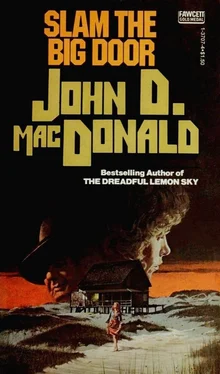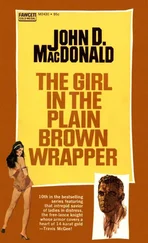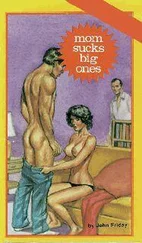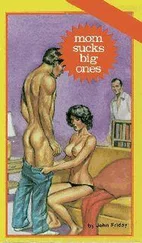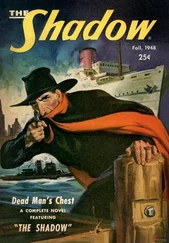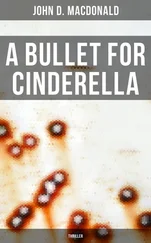John MacDonald - Slam the Big Door
Здесь есть возможность читать онлайн «John MacDonald - Slam the Big Door» весь текст электронной книги совершенно бесплатно (целиком полную версию без сокращений). В некоторых случаях можно слушать аудио, скачать через торрент в формате fb2 и присутствует краткое содержание. Город: Greenwich, Год выпуска: 1960, ISBN: 1960, Издательство: Fawcett Gold Medal, Жанр: Современная проза, на английском языке. Описание произведения, (предисловие) а так же отзывы посетителей доступны на портале библиотеки ЛибКат.
- Название:Slam the Big Door
- Автор:
- Издательство:Fawcett Gold Medal
- Жанр:
- Год:1960
- Город:Greenwich
- ISBN:978-0-449-13707-9
- Рейтинг книги:3 / 5. Голосов: 1
-
Избранное:Добавить в избранное
- Отзывы:
-
Ваша оценка:
- 60
- 1
- 2
- 3
- 4
- 5
Slam the Big Door: краткое содержание, описание и аннотация
Предлагаем к чтению аннотацию, описание, краткое содержание или предисловие (зависит от того, что написал сам автор книги «Slam the Big Door»). Если вы не нашли необходимую информацию о книге — напишите в комментариях, мы постараемся отыскать её.
Before the story is done, the pulse has run wild...
Slam the Big Door — читать онлайн бесплатно полную книгу (весь текст) целиком
Ниже представлен текст книги, разбитый по страницам. Система сохранения места последней прочитанной страницы, позволяет с удобством читать онлайн бесплатно книгу «Slam the Big Door», без необходимости каждый раз заново искать на чём Вы остановились. Поставьте закладку, и сможете в любой момент перейти на страницу, на которой закончили чтение.
Интервал:
Закладка:
“Grady told me about your farewell performance in the office.”
“I can just barely remember that. I did a great job. It was just a few days after she disappeared. I don’t know how many.”
“Strange girl.”
Troy stared into space. “There should be a better word than that. I think about how it was. And sometimes it makes me want to throw up. It couldn’t have been me. But I’ve got this fear, Mike. That if I ever saw her again... I’d either kill her, or it would be the same thing all over again. But this time... there’s not as much to lose. You can only lose your career and your wife one time.”
“Maybe it will be easier... in one sense, not having so much to lose.”
“It’s a big comfort to me. Sorry. I didn’t mean to sound snotty. I’m dead, Mike. In a special way. Walking, breathing, eating, but dead. You’ve been swell. And there’s nothing more to say about the whole thing.”
“Delayed combat fatigue?”
“That’s a wild idea.”
“Is it? Take it this way. They didn’t kill you. They just twisted you a little. New values. But the values didn’t fit you, Troy. And it took you a long time to find out. Then the roof fell in.”
Troy studied him. “Interesting. You know, if I was anxious to find an excuse for myself, boy, I’d be hanging on every word. But somehow I don’t give a damn about the reasons. I know what happened. It happened. I didn’t dream it. Keep your psychiatrics.”
“You must be better, you’re so much nastier.”
For the first months after Troy left he wrote at dutiful intervals, and his letters had somewhat the flavor of those a boy might write home from army training. He had decided on Ravenna, Florida. Big opportunities for growth. He was working for Brail Brothers Construction, living in a used house trailer he bought, doing a lot of weekend fishing. The letters became less frequent and had a more distant tone. In August of 1954, he started his own small firm, doing foundation work on subcontract. Troy Jamison, Builder. They got a card at Christmas, with a short note. He was busy and prospering, had made a small investment in land and was putting up three low-cost spec houses.
In late March he wrote them that he had married Mrs. Mary Dow, a widow. The next communication was a Christmas card, without note, from Troy and Mary Jamison. It looked elegant and expensive. And others in 1956 and 1957 and 1958, except that in 1958 he knew about Buttons and no cards went out.
About two weeks before the whole thing was over, after Buttons was back in the hospital again, a letter came to the house for her from Bonita Linder, and Mike opened it. It was a warm, amusing, chatty letter, and she sounded a little bit cross about not hearing from Buttons in months.
It made Mike realize that it wasn’t entirely fair to leave Bunny, who after all the years was still Buttons’s best friend, completely out of it. By then, through that sardonic miracle, there was enough money, and he had quit the paper in order to spend more time with her. And he was trying desperately to be steady and dependable and reliable and unhysterical about the whole thing. So that evening he had placed a call to her in Colorado, and tried to tell her how things were with Buttons. But in the middle of it something broke, and she arrived two days later, leaving the girls and her three-year-old son on the ranch, and moved in and took over with a compassionate efficiency that made things a little easier than they had been. The two women had some chances to talk, and it seemed to make Buttons a little less scared of the blackness dead ahead of her — not that she had ever whined or even come close to it, but you could tell about the being scared.
So he thought he had been prepared for it, that he was braced for it. But when it happened it was worse than he had been able to imagine. It was like being struck blind and sick and dumb, and left in a world of strangers.
There were plenty of friends to try to help, but Bunny helped the most. She organized the routines of death, and got him and the boys through it somehow, and stayed until he could talk to her about the future — a word that had always had a nice ring to it, but now had an ironic connotation. Bunny had wisdom. She sensed that if he tried to hold the family unit together it would be an artificial thing, and bad on the three of them. If the boys were younger they would need that security, but at fifteen and seventeen, it would be like three men forever aware of the empty chair, the empty room, the silences where her voice had been. So, in addition to getting rid of Buttons’s things, instinctively knowing the things he would want to keep, she made the arrangements to get the boys into the Melford School, and through the subtle uses of propaganda, got them into a frame of mind where they were looking forward to it.
She talked with Mike about the money, and she said she felt that old wheeze about hard work effecting a cure was largely nonsense. The thing to do was get away, go somewhere with no obligations, and sit and mend — and told him he was lucky he could afford it.
She wanted him to come to the ranch, but he said maybe later. He had written to all the faraway friends about Buttons, and all of them had answered. But Troy hadn’t, and that was a special hurt, combined with indignation.
After they drove the boys up and got them settled, Bunny went back to her kids and husband. He had promised her he would go away. Close the house for an indefinite time and go away. But after she was gone he couldn’t seem to make the move. He lived in the emptiness of the house, and often he would not answer the phone or the door, and he did not eat very well. He could not seem to get enough sleep.
And then the letter came from Troy. It was a good letter. He explained they had been on a cruise, hadn’t had their mail forwarded, had come back and tried to reach him by phone. He insisted Mike take time off from work and come down and stay as long as he could. Mary Jamison had written her warm invitation at the bottom of the letter. It was the stimulus he had needed. So he had made the arrangements and gone down, and been met by Troy in a shining car a half block long, and been driven down through St. Pete, and over a bridge, and down through Bradenton and Sarasota to Ravenna and on down to Riley Key to a home so beautiful, a wife so gracious, in a setting so sun-and-sea spectacular that Troy Jamison was obviously fighting to keep from showing understandable pride.
He had explained to Troy about the money, but had concealed that the fact of his unemployment was largely the result of Bunny’s instinctive wisdom about him and the shattering extent of his loss. Left to his own devices, he would have gone back to work, would have tried to dull mind and memory by knocking himself out on the job and trying to keep up a shallow imitation of a family unit.
On the second day of his visit, on Tuesday, alone on the beach, he had suddenly lost all reservations and knew that Bunny had been right. He wasn’t the kind of man who could make an adjustment to loss by turning away from it. He had to be alone where he could look at it squarely and brace himself solidly, and then open himself up to the realization of the total significance of it. It was his only hope of mending, and Bunny had sensed it.
He sat on the side of his bed and drained the drink and sighed again, then went to the small desk to write to his sons. They did not like joint letters. They wanted one apiece.
“Dear Micky, There is a curious phenomenon down here called sunshine. I will try to explain it to you. Every day this big round yellow thing comes up out of the east, surrounded by a sky which is an abnormal blue instead of the grubby gray we’re used to. Exposure to this yellow thing turns people bright red instead of the infinitely more pleasing fish-belly white, but the natives down here seem to feel this ugly red is a desirable...”
Читать дальшеИнтервал:
Закладка:
Похожие книги на «Slam the Big Door»
Представляем Вашему вниманию похожие книги на «Slam the Big Door» списком для выбора. Мы отобрали схожую по названию и смыслу литературу в надежде предоставить читателям больше вариантов отыскать новые, интересные, ещё непрочитанные произведения.
Обсуждение, отзывы о книге «Slam the Big Door» и просто собственные мнения читателей. Оставьте ваши комментарии, напишите, что Вы думаете о произведении, его смысле или главных героях. Укажите что конкретно понравилось, а что нет, и почему Вы так считаете.
